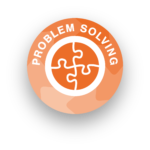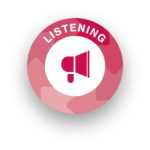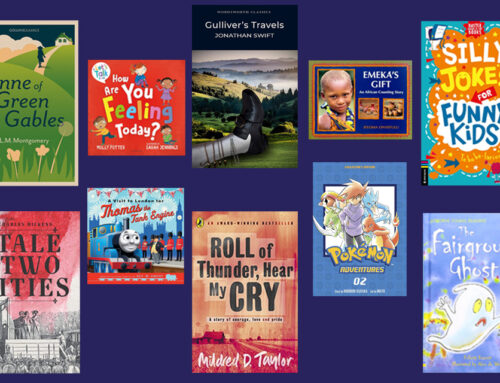Why do we so often feel it is better for children to get stuck into a ‘proper book’ rather than clutch comics or read from any sort of screen? What about High Learning Potential (HLP) readers; do traditional values count two-fold or should new approaches apply?
Statistically, today’s children are reading more than ever. Surely that’s a good thing? Well yes, but those statistics include in-game text and chat messages displayed on digital screens. So, should we welcome those formats, or are we right to judge some kinds of reading to be more worthwhile than others?
In her article “Reading Instruction With Gifted and Talented Readers“, Patricia F. Wood draws parallels between the real-life challenges of meeting the needs of a precocious reader and the hurdle-strewn path faced by gifted Klaus Baudelaire in the “unfortunate series” of Lemony Snicket tales. She suggests sympathetically that “most teachers use their passion for teaching […] to design learning opportunities matched to their students’ needs. Unfortunately, many of these teachers, although highly trained in how to teach reading to beginning and struggling readers, have received little or no professional development in how to meet the needs of their gifted and talented readers.” So, what advice is out there to help parents, home educators and teachers of modern HLP students satisfy the literacy demands of this often misunderstood group?
Think Outside the (Book) Box!
Potential Plus UK have produced several factsheets to support parents and educators of HLP children. Factsheet PA 108: Reading List for Key Stage 2 High Learning Potential Children explains that “High learning potential children’s emotional development is often out of line with their reading ability and anyone supporting them needs to consider the appropriateness of the subject of the book, along with the level of difficulty.” This mis-match of age, ability and emotional readiness in HLP youngsters is common and generally termed ‘asynchronous development’.
This theme is also picked up in Factsheet PA 102: Characteristics Of Children With High Learning Potential, which highlights that even between the ages of 1 and 4 years old, these youngsters are likely to have an “increased interest in books [and…] interest in computers. Ability to read easy readers by age 4 [and…] rather independent on the computer by age 4”. Described as ‘avid readers’, many will “enjoy different kinds of books to entertain them (imaginative fiction) and extend their learning (topic and non-fiction books). Many enjoy poetry because of the play with words and sounds and the different ways of making sense of the world. HLP children often progress very quickly from picture books and devour all kinds of reading material. Some HLP children learn to read easily but enjoy a more limited range of material, for example only reading non-fiction for learning about particular topics.”
So, it seems, then, that with HLP readers the key is not so much to force a reading schedule, subject area or single medium, but to identify the individual’s interests and strengths and think outside the box! Yes, this may mean allowing comics and screen time, but carefully chosen there can still be plenty of educational or recreational content that is appropriate to the child’s age and individual emotional development. More importantly, perhaps, is to simply encourage any word repetition practice that reinforces a positive experience of reading.
Comics and Computers?
Factsheet PA 109: Comic Books suitable for Younger Readers advises; “Early readers often progress through different types of books quickly, and they appreciate the mixture of visual information and text that comic books offer. However, popular comic books sometimes deal with mature subjects so can be unsuitable for younger readers.”
Here again we are reminded to look out for asynchronous development. Can using new media and carefully selected digital sources actually provide the stimulation of a printed comic, but paradoxically within safer, child-appropriate boundaries?
Factsheet PA 108 continues, “It is important that high learning potential children are given opportunities to read aloud even though they can read well and fluently, since they will come across unfamiliar words in their reading and they may get into the habit of mispronouncing them.” This can of course be handled very competently by human dedication, however software designed for the UK market’s pronunciation is now available to ‘read to’ the child or ‘speak’ any words questioned individually. Games software or educational packages that read a book out loud and interactively can easily be bought for games consoles, computer, tablet or phone. These should never totally replace listening to a child reading, but quality software can provide a tireless, even-tempered source of input and feedback that at times is greatly beneficial to both young learner and their adult guide.
Factsheet PA 108 goes on to say “High learning potential children will also benefit from practising new vocabulary by incorporating it into written work after checking the meaning with an adult or using a (virtual) dictionary (http://www.thesaurus.com or http://www.visuwords.com ) and looking for synonyms.” Again, we see that screen-time and software can actually be a hugely welcome addition to the team supporting the seemingly endless enquiries of an HLP reader!
From Classics to Modern
There is a lot to be said for getting to know ‘the Classics’…and in this high-tech world, a child with their eyes glued to a tablet might actually be reading Shakespeare via download! Layered on top of that, HLP children frequently report strong sensory reactions. This could mean they struggle with the texture, sound or reflectivity of paper, for example, and prefer the adjustable volume, brightness settings and uniform smoothness of a touchscreen. So paradoxically to our ingrained thinking, screen-based reading can hold all sorts of depths.
In her article “Digital Text is Changing How Kids Read—Just Not in the Way That You Think”, (Mindshift, KQED), Holly Korbey notes how even avid readers can appear to “skim” digital books, yet are more likely to work through a printed publication. However, is this to do with the format alone? Or is it because online services encourage readers to ‘flip’ through e-books first to see if they appeal, similarly to idly browsing easily accessible ‘physical’ library books. If the latter, a digital subscription service might actually be ideal for many quick-reading HLP youngsters; from those wanting to research a particular factual topic in-depth and ‘right now’ to others wishing to move on immediately to the next work of fiction in a series.
Combining printed and digital resources might also be an excellent solution to the idea raised in Factsheet PA108 “Theme reading on particular topics of interest will help to develop new vocabulary and broaden the scope of their reading: moving from a book they have enjoyed to information books about the theme then back to another fiction book.”
Be aware of misinterpreting ‘skimming’. “Many young children with high learning potential teach themselves to read at a very early age. By the time they enter early childhood education they may already be sounding out letters, reading signs, or reading accurately both aloud and silently. Some children are such good readers that their silent reading speeds may cause it to seem as if they are skimming through picture books. They may also be concentrating so deeply on their reading that they are unaware of people speaking to them, or teachers attempting to engage their attention. As many adults assume children must be taught to read, even parents can be surprised by the reading abilities of their child!” Factsheet PA104: Early Years and High Learning Potential
Build Up to Pay-offs
Cognitive scientist Daniel T. Willingham believes digital devices are not changing children’s brain processes so much as their reading habits. Tellingly, he comments: “What I think that all the digital activities have in common is that, with very little effort from me, [a young reader,] something interesting happens. And if I’m bored, another interesting experience is very easy to obtain.” Willingham recommends we “help kids distinguish between the easy pleasures of some digital media, and the more complex pay-off that comes when reaching the end of the Harry Potter series. […Create a] larger strategy to make reading a family value.”
For assistance with ‘family’ or Home Education reading lists, Potential Plus UK offer a further range of advice sheets available to download.
Attention and Discernment
There are debates as to whether traditional books encourage ‘deep reading’ in a way that screen-based reading behaviour does not. Interestingly, reading researcher Julie Coiro believes that “reading online actually requires more attention than reading a paper book [and] an astounding amount of self-regulation. […] It used to be that there was a pre-reading, the reading itself and the evaluation at the end of your chapter or at the end of a book. Now that process happens repeatedly and in about 4 seconds.” She continues that digital readers “are faced with almost limitless input and decisions, including images, video and multiple hyperlinks that lead to even more information. […] This process doesn’t happen automatically, but the brain must work to make each choice a wise one.”
When Suren Markosian, co-founder and CEO of book-share app ‘Epic!‘ developed his business, he modelled the software on his wishes for his own young children. To help them to concentrate on the storybook text alone, Markosian describes how they “made a conscious choice to keep ads, video content and hyperlinks outside of the book-reading experience. […] Once inside a book, you get a full-screen view; you are basically committing to reading the book and nothing else.” In contrast to this, one of Coiro’s studies found that “The ability to generate search terms, evaluate the information and integrate ideas from multiple sources and media makes online reading comprehension a critical set of skills that builds on those required to read a physical book.”
Again, know your HLP learner and you will be able to determine if their planning and analysis skills are lagging behind their actual reading level. If so, a considered amount of web-enabled learning could be the way to go.
Seize the Moment!
Ever heard it said that, any single moment, the typical HLP child’s interest level and attention span are either firmly switched ‘on’ or ‘off’? Perhaps engaging your child in deep reading is about seizing the right moment. Getting to know the moods and learning style of your HLP child would be a great guide for you – and eventually for themselves.
This idea is echoed in Sally Yahnke Walker’s The Survival Guide for Parents of Gifted Kids, which says “Gifted children master reading, like so many tasks, when they’re ready and when they see the benefits it can bring them.” This, too, points towards encouraging HLP children to learn to read or deepen their reading skills in a way and at a time that most motivates them. Seize on their enthusiasm and use it to help build the kinds of wider skills our HLP youngsters are likely to need.
Embrace digital and traditional media, fact and fiction, rapid messaging and weighty ‘Classics’. Inspire communication, research, deeper skills, fun and a love of language. Tailor and time all of this to be interesting to, and appropriate for, the individual HLP learner and their skillset. And be happy to thoughtfully switch on screens and open up comics to allow a new reading superhero to emerge.
Related Links and References:
For a range of advice sheets and reading list suggestions, visit us at Potential Plus UK; https://potentialplusuk.org/index.php/advice-sheets/
Patricia F. Wood. Reading Instruction With Gifted and Talented Readers: A Series of Unfortunate Events or a Sequence of Auspicious Results? https://files.eric.ed.gov/fulltext/EJ803362.pdf
Holly Korbey. https://www.kqed.org/mindshift/49092/digital-text-is-changing-how-kids-read-just-not-in-the-way-that-you-think
Holly Korbey. https://www.kqed.org/mindshift/46501/how-to-help-students-develop-a-love-of-reading
Daniel T. Willingham’s website http://www.danielwillingham.com/
Daniel T. Willingham. The Reading Mind: A Cognitive Approach to Understanding How the Mind Reads
Julie Coiro. Predicting reading comprehension on the internet http://journals.sagepub.com/doi/10.1177/1086296X11421979
Sally Yahnke Walker. The Survival Guide for Parents of Gifted Kids; How to Understand, Live With and Stick Up for Your Gifted Child








